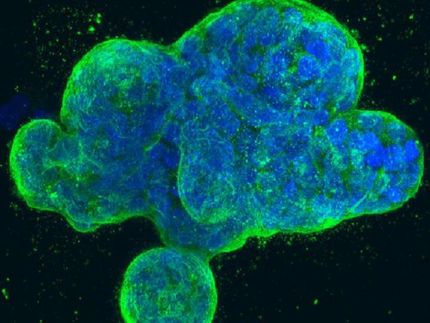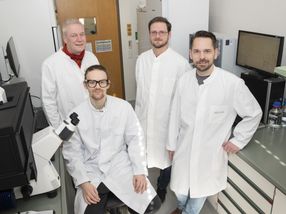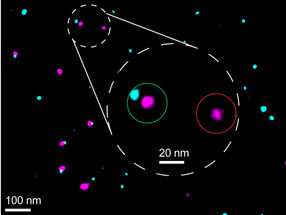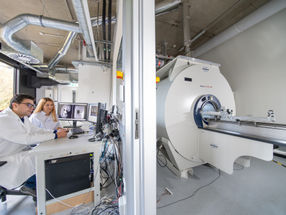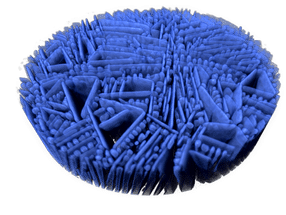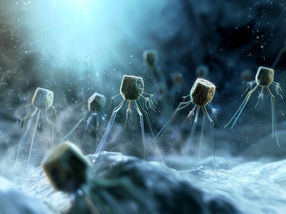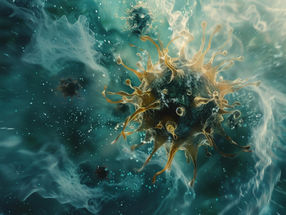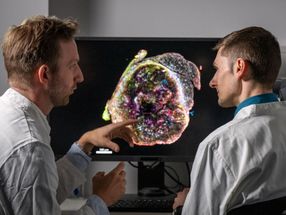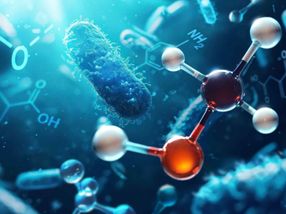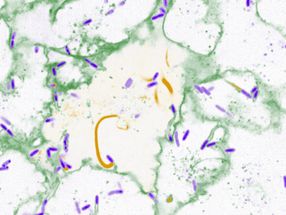How brain tumors develop from stem cells
What causes cancer? This is still one of the most burning questions today. cancer stem cells are increasingly to be found in the spotlight of research. Researchers from the Biozentrum of the University of Basel and the Austrian Academy of Sciences have found that the loss of function of a protein complex can cause brain tumors, this occurring through progenitor cells reverting back into neural stem cells. Their findings have been recently published in Cell.
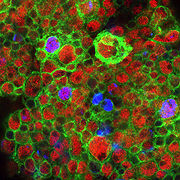
Neural stem cell-derived brain tumors in Drosophila. The tumor (green) contains mostly stem cell-like cells (red) that are highly proliferative (blue).
Universität Basel
Over the last years, the suspicion that various forms of cancer are often triggered by so-called cancer stem cells has become further substantiated. In these cells, the strict control, which usually regulates stem cells, is lost through mutations. This enables the cancer stem cells to self-renew in an uncontrolled manner, causing tumors. Prof. Heinrich Reichert from the Biozentrum, University of Basel, together with Jürgen Knoblich, a professor at the Institute of Molecular Biotechnology of the Austrian Academy of Sciences, have identified a protein complex in neural stem cells of the fruit fly Drosophila melanogaster, which ensures the correct development of stem cells and thus prevents the formation of cancer.
How cancer stem cells arise
In Drosophila, immature progenitor cells develop from normal neural stem cells. These then mature further through various developmental stages to finally become nerve cells. The teams led by Reichert and Knoblich have discovered important components – parts of the SWI/SNF protein complex, as well as its target protein called Hamlet – which initiate a rigid control program in the progenitor cells. It ensures that cell division is limited and prevents the progenitor cells from reverting back into stem cells. In addition, it is important for timely cell-cycle exit and preserves the temporal identity of the progenitor cells.
In many human cancer cells, mutations of the single components of the SWI/SNF complex are observed strikingly often. The role of the SWI/SNF complex in the development of tumors was previously not known. “Our findings in the genetic model of the fruit fly explain the tumor suppressor activity of the SWI/SNF protein complex,” says Reichert. “Mutations can disrupt the function of the complex and lead to the dedifferentiation of progenitor cells. This is how they regain a stem cell-like capacity for self-renewal, divide in an uncontrolled manner and can thus cause brain tumors.”
The origin of cancer stem cells
The cancer stem cell concept assumes that tumors not only consist of a collection of mutated cells but rather originated from abnormal stem cells, which through genetic or epigenetic mutations, produce degraded progenitor cells that divide uncontrollably. Cancer stem cells stand quite high in the hierarchy. Despite the fact that defects in stem cells can cause tumors, as Reichert and Knoblich demonstrate in their study, the trigger can actually be a descendant of the stem cell. Mutations in the SWI/SNF components drive tumor development in various tissues, including the brain. The precise understanding of the underlying mechanisms is important for the treatment of tumors originating from stem cells.
Original publication
Other news from the department science

Get the life science industry in your inbox
From now on, don't miss a thing: Our newsletter for biotechnology, pharma and life sciences brings you up to date every Tuesday and Thursday. The latest industry news, product highlights and innovations - compact and easy to understand in your inbox. Researched by us so you don't have to.
